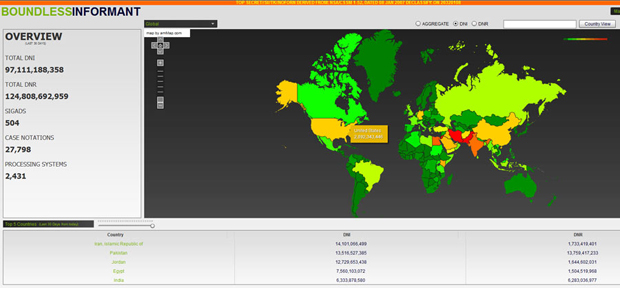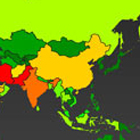While the official Chinese reaction to Edward Snowden’s Prism leaks has been muted, ordinary Chinese have been quick to point out the US’ double standard on espionage, Alice Xin Liu writes

Snapshot of Boundless Information global heat map of data collection. The color scheme ranges from green (least subjected to surveillance) through yellow and orange to red (most surveillance). (NSA)
People’s Daily, the official newspaper of China’s communist party, recently pointed out in an editorial that extraditing Snowden would be “face-losing” outcome for both Hong Kong’s and China’s governments. The paper said that the whistleblower had not committed any crime. All he did was “blow the whistle on the US government’s violation of civil rights.”
The editorial concluded, “China is generous enough not to hype this incident in consideration of the Sino-US relationship”.
On the streets, bewilderment accompanied Snowden’s revelations and eventual flight to Russia despite a US warrant for his arrest. The Chinese, who value earning potential, wonder why Snowden left a hefty $200K job. But most bemoaned what is perceived as the complete double standard of the US.
When the popular Phoenix Weekly asked on Sina Weibo what people thought of letting Snowden leave Hong Kong despite the US warrant, a commenter “Strawberry on the Third Ring Road” replied:
“If I was from Hong Kong I would completely ignore the old Yanks. Nothing’s going to change. Go about life as normal.”
Chinese netizens have reacted more strongly on Twitter, comparing Snowden’s claims about US spying with China’s Great Firewall, which filters domestic sites and blocks some sites from outside China. Though more people use Weibo than Twitter, which is blocked, they rarely talk about the Great Firewall because Weibo filters key words and sensitive terms on behalf of the government.
Rose Luqiu Luwei, a Phoenix TV presenter and popular blogger, tweeted: “Recording my show yesterday, someone asked the question, Could China produce someone like Snowden? The guests answered very concisely: No. Even if it did, they’d never be able to leave the country.”
Retweeting her, Wen Yunchao, a blogger and Internet freedom activist, wrote:
“If a GFW [Great Firewall] engineer wants protection in order to leave the country and offer leaks, and doesn’t have a passport, I’m willing to help.”
Wen wasn’t joking. As a vocal critic of the censorship system in China, he was harassed regularly, and eventually fled Hong Kong to New York, where he is now based.
Chinese journalist Michael Anti, who is famous for a Ted talk he gave about internet censorship in China, held a more cynical and objective point of view. He explained to over 60,000 followers on Weibo why China would want to be rid of Snowden:
“No matter what, Hong Kong should quickly send Snowden on his way to a third country (citing the reason of incomplete documents from the US). This is really a very suitable method. He is a hot potato, Hong Kong is unable to hold him, and China can’t stick by him. Why not leave him for the mafia boss that is Russia or a real democratic country, Iceland?”
However, as the latest leaks of US spying emerged, even Anti was skeptical of how the US was handling its coverage, commenting that the Obama’s administration failed to engage in crisis management by simply repeating Snowden’s claims verbatim.
As part of a special report on Snowden, the Global Times conducted an online poll of 1,400 urban residents in China, asking how they felt when they found out that the US had been spying on China. Sixty-one percent of the respondents chose the following answer: “The US always stands facts on their heads, like a thief yelling, ‘stop thief.’ ”
Interestingly, when asked what should be done to remedy the situation, most people didn’t want to “appeal to the international community to jointly formulate regulations regarding cyber space” but rather “train high-level cyber space security personnel to better protect China.”
This echoed what is widely believed in China — that the US is not to be trusted.
Alice Xin Liu is a freelance writer based in China. She tweets @axliu





